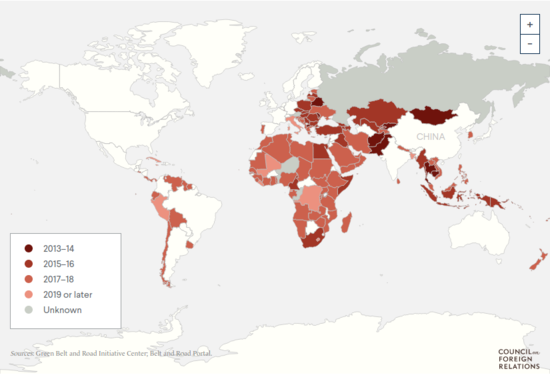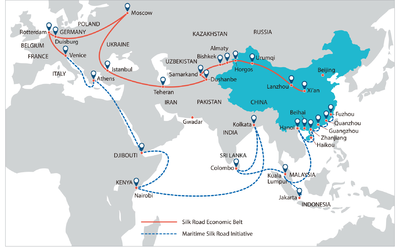Difference between revisions of "Belt and Road Initiative"
Jump to navigation
Jump to search

 This page imported content from Wikipedia on 18 February 2019.
This page imported content from Wikipedia on 18 February 2019.
Wikipedia is not affiliated with Wikispooks. Original page source here
(Referencing) |
(picture added) |
||
| Line 2: | Line 2: | ||
|wikipedia=https://en.wikipedia.org/wiki/Belt_and_Road_Initiative | |wikipedia=https://en.wikipedia.org/wiki/Belt_and_Road_Initiative | ||
|image=BRI.png | |image=BRI.png | ||
| − | |image_width= | + | |image_width=400px |
}} | }} | ||
The '''Belt and Road Initiative''' ('''BRI''') is a development strategy adopted by the [[China|Chinese government]] involving infrastructure development and investments in countries in [[Europe]], [[Asia]] and [[Africa]]. "Belt" refers to the overland routes for road and rail transportation, called "the Silk Road Economic Belt"; whereas "road" refers to the sea routes, or the 21st Century Maritime Silk Road. Until 2016, the initiative was officially known in English as the '''One Belt and One Road initiative''' but the official name was changed as the Chinese government considered the emphasis on the word "one" prone to misinterpretation.<ref>''[https://www.theguardian.com/world/2017/may/12/the-900bn-question-what-is-the-belt-and-road-initiative "The $900bn question: what is the Belt and Road initiative?"]''</ref> | The '''Belt and Road Initiative''' ('''BRI''') is a development strategy adopted by the [[China|Chinese government]] involving infrastructure development and investments in countries in [[Europe]], [[Asia]] and [[Africa]]. "Belt" refers to the overland routes for road and rail transportation, called "the Silk Road Economic Belt"; whereas "road" refers to the sea routes, or the 21st Century Maritime Silk Road. Until 2016, the initiative was officially known in English as the '''One Belt and One Road initiative''' but the official name was changed as the Chinese government considered the emphasis on the word "one" prone to misinterpretation.<ref>''[https://www.theguardian.com/world/2017/may/12/the-900bn-question-what-is-the-belt-and-road-initiative "The $900bn question: what is the Belt and Road initiative?"]''</ref> | ||
The Chinese government calls the [[BRI]] "a bid to enhance regional connectivity and embrace a brighter future".<ref>''[https://www.fnlondon.com/articles/chinese-revolution-could-lure-overseas-investment-nicholas-firzli-20151012 "Chinese revolution could lure overseas investment"]''</ref> | The Chinese government calls the [[BRI]] "a bid to enhance regional connectivity and embrace a brighter future".<ref>''[https://www.fnlondon.com/articles/chinese-revolution-could-lure-overseas-investment-nicholas-firzli-20151012 "Chinese revolution could lure overseas investment"]''</ref> | ||
| + | |||
| + | [[File:BRI2.png|left|550px|thumb|A 2021 map by the [[CFR]]]] | ||
| + | |||
{{SMWDocs}} | {{SMWDocs}} | ||
==References== | ==References== | ||
Revision as of 22:09, 13 September 2021
 | |
| Interest of | • Kimberley Kitching • Andrew Korybko |
The Belt and Road Initiative (BRI) is a development strategy adopted by the Chinese government involving infrastructure development and investments in countries in Europe, Asia and Africa. "Belt" refers to the overland routes for road and rail transportation, called "the Silk Road Economic Belt"; whereas "road" refers to the sea routes, or the 21st Century Maritime Silk Road. Until 2016, the initiative was officially known in English as the One Belt and One Road initiative but the official name was changed as the Chinese government considered the emphasis on the word "one" prone to misinterpretation.[1]
The Chinese government calls the BRI "a bid to enhance regional connectivity and embrace a brighter future".[2]

A 2021 map by the CFR
Many thanks to our Patrons who cover ~2/3 of our hosting bill. Please join them if you can.
References
Wikipedia is not affiliated with Wikispooks. Original page source here